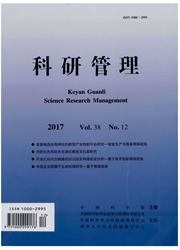

 中文摘要:
中文摘要:
政府补贴是激励企业创新的主要手段。以2010—2013年278家战略性新兴产业上市公司为研究对象,利用固定效应面板模型研究政府补贴对企业R&D投入的影响效应,结果显示:政府补贴存在一个临界点,低于此点的补贴强度可以诱导企业R&D投入,高于此点的补贴强度会挤出企业R&D投入;企业寻租行为有利于政府补贴杠杆效应的发挥,但由于寻租属于企业的非生产性活动,通过寻租获得补贴扭曲了旨在促进创新的政府补贴政策。
 英文摘要:
英文摘要:
Government subsidies are the main means of stimulating corporate innovation. With the sample of 278 firms of strategic emerging industries from 2010 to 2013, this paper applied the fixed panel data model to study the effect of government subsidies on R&D investment. The empirical study results show that: first, government subsidies have a critical point, and when the subsidy is lower than the point, it will induce more R&D investment, otherwise, the subsidy will have a crowding - out effect on companies' R&D investments ; second, firm' s rent - seeking behavior can improve the leverage effect of government subsidies. However, rent - seeking behavior is not a productive activity, so obtaining subsidies through rent - seeking will distort the government subsidy policy, which is aimed at promoting R&D innovation.
 同期刊论文项目
同期刊论文项目
 同项目期刊论文
同项目期刊论文
 期刊信息
期刊信息
